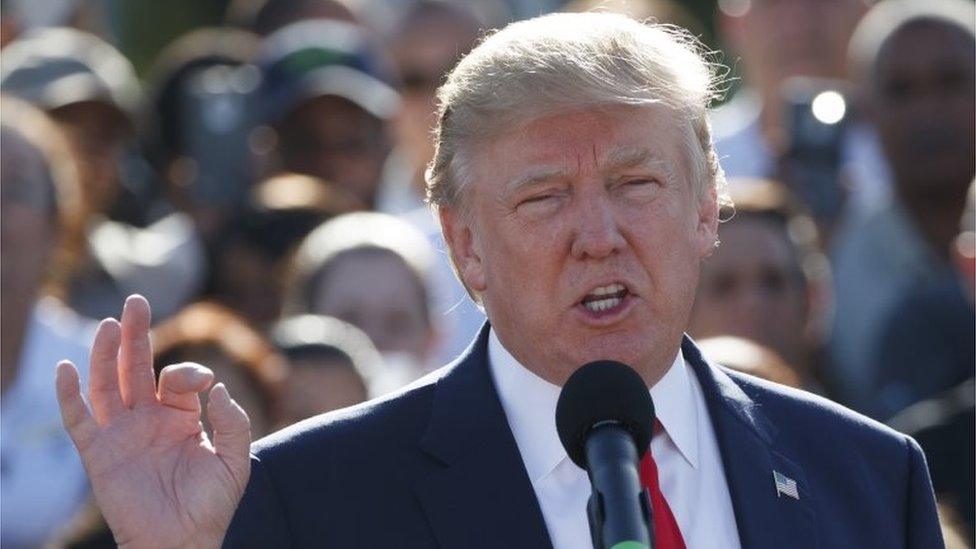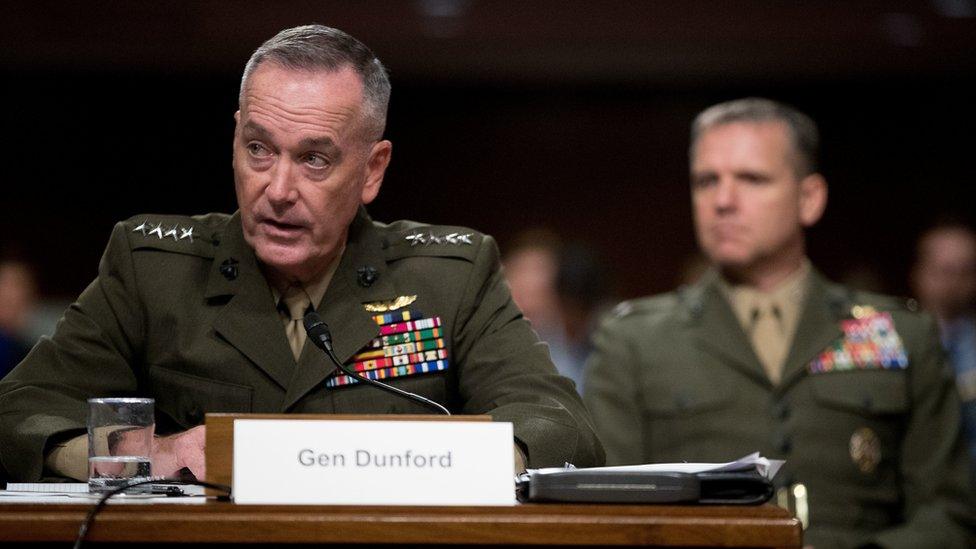Trump: Clinton's foreign policy plan would start WW3
- Published
- comments

Donald Trump: "Russia is a nuclear country, but a country where the nukes work"
Republican presidential candidate Donald Trump has said his rival Hillary Clinton's foreign policy plan in Syria would trigger World War Three.
He also said the US should focus on defeating so-called Islamic State (IS) rather than removing Syria's president.
Mrs Clinton has proposed a no-fly zone over Syria. The top US military chief has said that could spell conflict with Russian jets in the region.
The Clinton campaign accused Mr Trump of "playing to Americans' fears".
Mr Trump also attacked Republicans for not uniting behind his candidacy.
"If we had party unity, we couldn't lose this election to Hillary Clinton," he told Reuters news agency at Trump National Doral golf resort in Miami, Florida.
The Republican standard-bearer struck an apocalyptic tone when criticising his Democratic rival's plan to control Syrian air space.
"You're going to end up in World War Three over Syria if we listen to Hillary Clinton," Mr Trump said.
"You're not fighting Syria any more, you're fighting Syria, Russia and Iran, all right?
Trump employees voting for boss
"Russia is a nuclear country, but a country where the nukes work as opposed to other countries that talk."
Mr Trump suggested there should be a refocus away from the long-held US position of trying to remove Syrian President Bashar al-Assad, saying: "What we should do is focus on IS. We should not be focusing on Syria."
He also suggested Mrs Clinton would be unable to talk with Russian President Vladimir Putin after her sharp criticism of him.
Mr Trump questioned "how she is going to go back and negotiate with this man who she has made to be so evil" if she is elected president on 8 November.
The Clinton campaign dismissed the criticism, saying both Republican and Democratic national security experts have denounced Mr Trump as unfit to be commander-in-chief.
"Once again, he is parroting Putin's talking points and playing to Americans' fears, all while refusing to lay out any plans of his own for defeating ISIS or alleviating humanitarian suffering in Syria," Clinton spokesman Jesse Lehrich said in a statement.
'Kill a lot of Syrians'
Mr Trump's warning of confrontation with Russia echoes concerns raised last month at a congressional hearing by the highest-ranking military officer in the US armed forces.
Chairman of the Joint Chiefs Marine Gen Joseph Dunford told lawmakers a "no-fly zone" in Syria could spell war with Russia.
"Right now, senator, for us to control all of the airspace in Syria it would require us to go to war, against Syria and Russia," Gen Dunford told the Senate Arms Services Committee.

America's highest-ranking military officer has warned against a US-imposed no-fly zone in Syria
"That's a pretty fundamental decision that certainly I'm not going to make."
At the final presidential debate in Nevada on 20 October, Mrs Clinton outlined her support for the measure.
"A no-fly zone can save lives and hasten the end of the conflict," she said on stage.
But in a 2013 speech to Wall Street firm Goldman Sachs, Mrs Clinton said establishing a no-fly zone would "kill a lot of Syrians", according to a transcript disclosed by Wikileaks.
The civilian death toll would result from the US needing to take out Syrian air defences, which are located in populous areas.
Her policy is not only a disagreement with President Barack Obama, but would be a significant escalation of US involvement in the Syrian conflict.
Mr Trump's comments come two weeks before election day and as his campaign grapples with a backlash over a string of accusers who have come forward with allegations of sexual assault.
The New York businessman, who is trailing Mrs Clinton in national polls, has railed against media and suggested members of the press were colluding to rig the election against him.
"The people are very angry with the leadership of this party, because this is an election that we will win 100% if we had support from the top," he said. "I think we're going to win it anyway."

What happens next?
The two candidates spend the remaining 13 days of campaigning, criss-crossing the country in their bid to persuade undecided voters. Expect to see lots of appearances in battleground states such as Ohio, North Carolina, Florida and Pennsylvania
Voters will go to the polls on Tuesday 8 November to decide who becomes the 45th president of the US
The new president will be inaugurated on 20 January 2017
More on the US election


